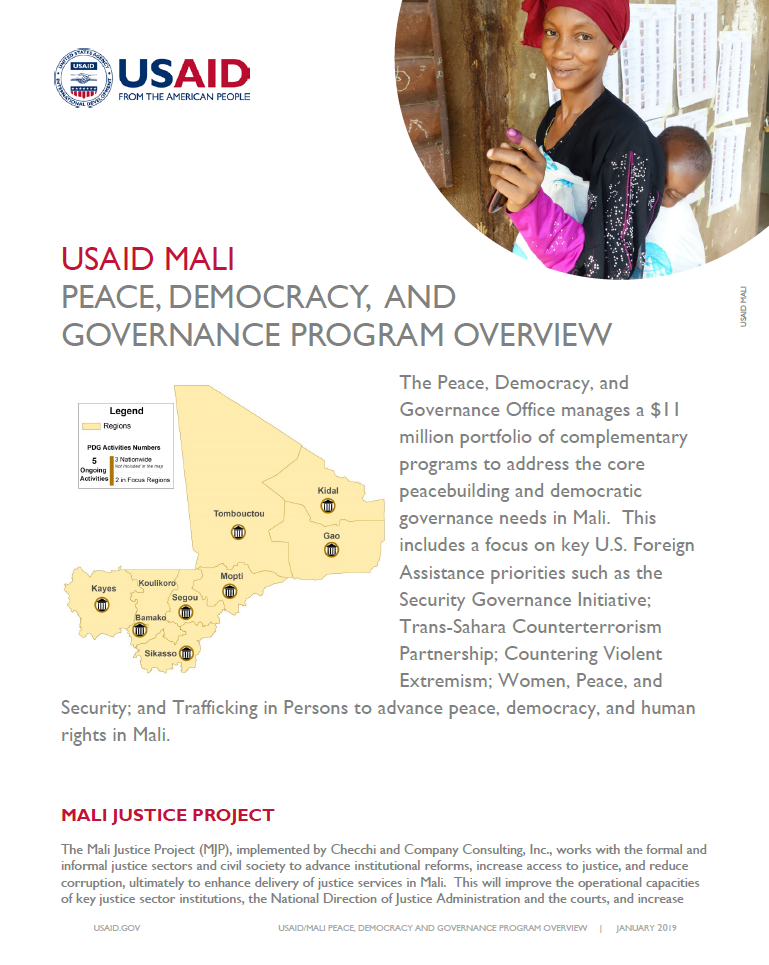Speeches Shim
Peace, Democracy & Governance Program Overview ![]() (pdf - 450k)
(pdf - 450k)
The Peace, Democracy, and Governance Office manages a $11 million portfolio of complementary programs to address the core peacebuilding and democratic governance needs in Mali. This includes a focus on key U.S. Foreign Assistance priorities such as the Security Governance Initiative; Trans-Sahara Counterterrorism Partnership; Countering Violent Extremism; Women, Peace, and Security; and Trafficking in Persons to advance peace, democracy, and human rights in Mali.
MALI JUSTICE PROJECT
The Mali Justice Project (MJP), implemented by Checchi and Company Consulting, Inc., works with the formal and informal justice sectors and civil society to advance institutional reforms, increase access to justice, and reduce corruption, ultimately to enhance delivery of justice services in Mali. This will improve the operational capacities of key justice sector institutions, the National Direction of Justice Administration and the courts, and increase availability of information on legal services, citizen rights, and justice-related reforms so that citizens better understand their rights under the Malian legal system. The project will also provide targeted legal and advocacy services along key trade routes to reduce the level of corruption and negative economic and social impact on Malians.
MALI SUB-NATIONAL GOVERNANCE PROJECT
The Mali Sub-National Governance Project (SNGP) works with the national and sub-national government institutions and civil society to capitalize on renewed efforts to decentralize authority and resources in Mali. Key to implementing the Algiers Peace Accord, the decentralization process will give more resources and authority directly to regional governments. The project will work to advance Mali’s regionalization process by increasing the ability of sub-national government entities to provide effective, responsive, and accountable service delivery to the citizens of Mali, particularly in the areas of health and education. Implemented by Tetra Tech, ARD, the project aims to ensure that public funds intended for regional and local services are transferred and spent effectively and transparently.
CIVIC ENGAGEMENT PROGRAM
The Civic Engagement Program (CEP) provides support in the form of tools and resources to Malians that enable them to fulfill their end of the social contract, and to make the government of Mali more responsive and accountable to citizens. CEP, implemented by FHI 360, aims to reinforce civil society’s watchdog role to provide checks and balances over the State to improve public sector service delivery and budget allocation, and was intentionally designed to foster greater inclusion of traditionally marginalized groups. Focused on the demand side of democratic governance, it is designed to complement USAID’s supply-side Sub-National Governance Project (SNGP), but both projects will actively target improved outcomes across development sectors. By emphasizing citizen empowerment and inclusion, CEP reinforces unity through diversity as one citizenry.
THE EMPOWERING MALIANS THROUGH ELECTION, REFORM AND GOVERNANCE EFFORTS
The Empowering Malians through Election, Reform and Governance Efforts (EMERGE) Project aims to advance peace, reconciliation and more accountable governance through credible and inclusive national elections. The program works to strengthen the capacity of citizens to participate in the 2018 elections as voters, activists, observers and candidates, and to advocate for key elections and political processes reforms and improved governance following the elections. EMERGE leverages two decades of institutional partnerships formed with Malian civil society, including women’s organizations, media and political parties, to enhance citizen engagement and transparency in Malian electoral processes.
PEACEBUILDING, STABILIZATION AND RECONCILIATION PROJECT
The purpose of this activity is to improve prospects for long-term peace, security, and reconciliation by building trust between conflict-affected communities and their government, strengthening the ability of communities to mitigate and manage conflict, prioritize and implement their community’s most pressing development needs, and empowering marginalized youth as change agents. The program is built upon a flexible foundation that prioritizes pressing development needs, i.e. “peace dividends," builds social cohesion and sequences, and integrates activities in harmony with other actors to leverage opportunities for change. This approach starts with small projects at the community level to develop a nuanced village by village understanding of conflict dynamics in order to build social cohesion and trust from the bottom up by strengthening local systems.


Comment
Make a general inquiry or suggest an improvement.